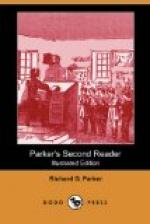Definitions.
1. In the last lesson, I gave you a word which you had not seen before, to find out the meaning of it, without looking in a dictionary.
2. I told you, in a former lesson, how the little Spanish girl found out the meaning of words which she did not know; and afterwards informed you how the infant child was taught to speak.
3. Now, I doubt not that you can speak a great many words, and know what they mean when you use them; but I do not think that you ever thought much about the way in which you learned them.
4. Perhaps you will be surprised to hear that everybody learns to talk and to use words in the same way that the little Spanish girl and the little infant learned them; that is, by hearing others use them in different ways, just as the word hippoi was used in the last lesson.
5. Nobody ever told you, probably, the meaning of a great many words that you know; and yet you know them full as well, and perhaps better, than if any one had told you about them.
6. Perhaps you have a brother whose name is John, or George, or James, or a sister whose name is Mary, or Jane, or Ann, or Lucy. You have always heard them called by these names, ever since you, or they, were quite young; and have noticed that when John was called, that the one whose name is John would answer; and as each one answered when spoken to, you learnt which was John, and which was Mary, and which was Lucy.
7. So also, when a certain animal, having two large horns and a long tail, and which is milked every night and morning, passed by, you heard some one say cow; and in this way you learned what the word cow means.
8. So also, when water falls from the sky in drops, little children hear people say it rains; and thus they find out what rain, means.
9. Now, when anybody asks you what any word means, although you know it very well, yet it is a very hard thing to tell what it means,—that is, to give a definition of it,—as you will see by the little story I am about to tell you.
10. A teacher, who was very anxious to make his scholars understand their lessons, once told them he had a very hard question he wished to ask them, and that he would let the one who answered the question best take the head of the class.
11. This teacher never allowed any of his pupils to speak to him without first raising his right hand above his head, to signify that the child had something to say; and when any child raised his hand in this way, if he was not busy, he called upon the child to say what he wished.
12. In this way he prevented the children from troubling him when he was busy; and in this way he also prevented them from interrupting each other, as would be the case if several of them should speak at once.
13. On the day of which I am about to speak, he said to them, Now, children, I have a very hard question to ask you, that does not require you to study, but only to think about it, in order to answer it well; and the one who gives me the best answer shall go to the head of the class. The question is this: What is a bird?




